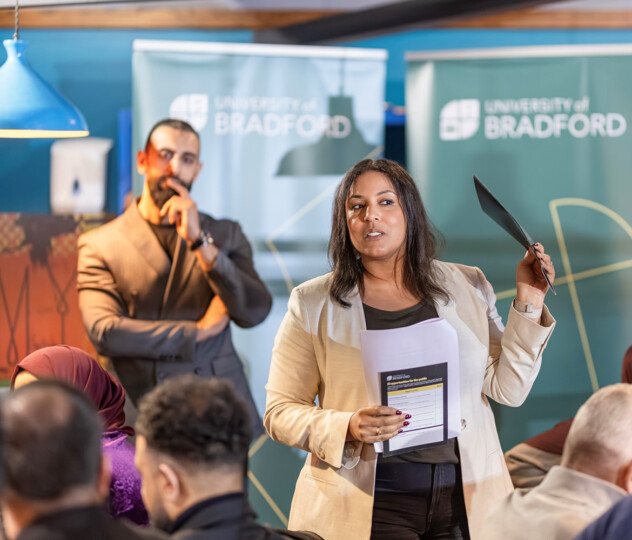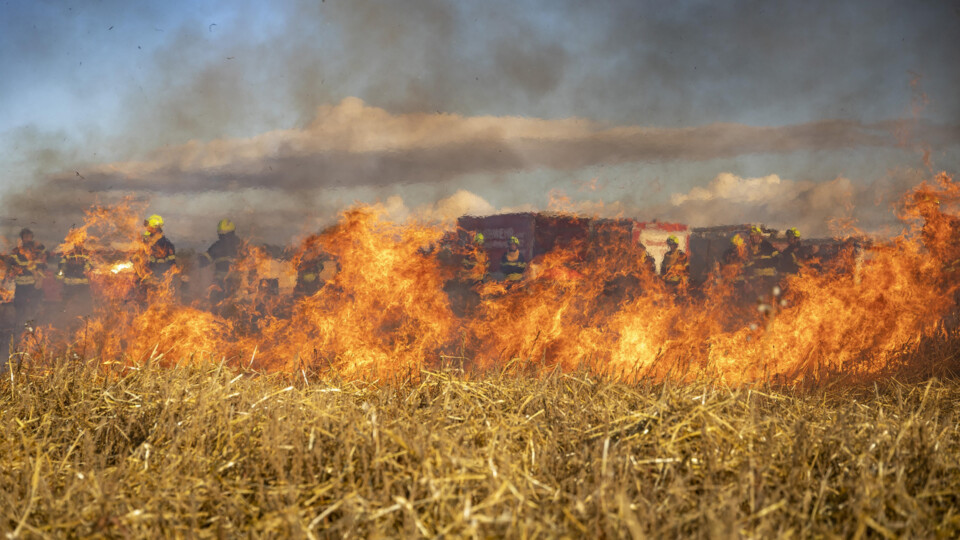How AI can be used to help combat wildfires
The University of Bradford is using artificial intelligence (AI) to spot wildfires early and send alerts to emergency teams, helping them act quickly and reduce damage.
Wildfire detection in remote areas is risky for responders, an issue raised at AI for All, the University of Bradford’s event at MyLahore in Birmingham on using new technologies to make a difference to people’s lives.
But researchers at the University’s School of Management are developing and evaluating the impact of AI to detect fire or smoke, through real-time high definition (HD) video camera footage, sending alerts using 6G technology to key services including remote control centres, to help with early interventions in such fires to help reduce the destruction caused and enhance the recovery efforts.

Dr Kamran Mahroof, Programme Leader for the MSc in Applied AI and Data Analytics at the University of Bradford, speaks to the audience at AI for All in Birmingham. Images credit: CN Photography and wildfire image: Fish96/Pixabay.com
In a wildfire scenario, AI analyses 6G-connected cameras to detect smoke early, creates an alert via a web interface, which is a way to interact with a program or service through a web browser, while a drone provides aerial imagery and network relay support, and a robotic dog scouts dense areas, delivers supplies, communicates with victims, and aids search and rescue.
AI systems can identify early signs of wildfires from camera feeds and satellite imagery.
Addressing global challenges
Dr Kamran Mahroof, the project’s Principal Investigator and Programme Leader for the MSc in Applied AI and Data Analytics at the University of Bradford, said: “Wildfires are a global phenomenon and have been increasing in frequency and intensity in recent years, posing growing threats to lives, communities, and ecosystems worldwide.
“We are immensely proud to be at the forefront of research addressing this pressing global challenge.
“Such projects show how real social and environmental impact can be achieved through innovative thinking and meaningful collaboration.
“Innovation can spark from a single idea but turning it into real-world outcomes thrives on the collaboration of diverse skills, combining technical expertise with creativity and fresh, out-of-the-box thinking.”

AI for All attendees gave their views on public opinions of AI. Images credit: CN Photography and wildfire image: Fish96/Pixabay.com
Sustainability impacts
The wildfires project is part of University of Bradford’s work to lead pioneering research into the socio-economic and sustainability impacts of disruptive technologies, including 6G networks and edge computing, which was awarded £1 million from the European Union’s Horizon Innovation Action programme earlier this year.
6G-VERSUS (6G Vertical Trials for Sustainability) integrates 6G technology with real-world experimentation to create sustainable 6G applications. With €12.1m in research and development funding distributed among 34 partners from industry, academia, and research institutions across six European countries, the project aims to design a 6G-enabled framework for vertical, AI, and network applications.
The wildfire pilot in Greece is just one of six geographically distributed pilots across Europe, each tackling a different environmental or sustainability challenge.
Alongside Dr Mahroof, the University of Bradford team comprises Professor Vishanth Weerakkody, Dr Amizan Omar, Dr Jing Li, Imesha Wedikkara Gedar and Shanaka Perera.

Dr Rachel Shrimpton hosted the University of Bradford’s AI for All event in Birmingham. Images credit: CN Photography and wildfire image: Fish96/Pixabay.com
AI for All
The wildfires research featured at AI for All, held in Birmingham, which brought together University of Bradford academics, alumni, civil leaders, teachers and community members to ask how everyone can ensure new technologies make a positive difference to people’s lives.
Topics under discussion at the event, hosted by Dr Rachel Shrimpton, the University’s MBA Director and Assistant Professor, Management, Sciences and Engineering, included how the digital divide can be addressed so AI does not widen equality in education and using AI for earlier detection of concussion in boxing and combat sports.
The audience were asked to rank, from highest to lowest, public concerns of AI including job loss fears, misinformation, and bias and unfairness.
The Birmingham event follows a showcase for the University’s work on AI held in Rochdale in June.

The table was set at MyLahore in Birmingham for a showcase of the University of Bradford’s work on artificial intelligence. Images credit: CN Photography and wildfire image: Fish96/Pixabay.com
Different is what we do
UNIDENTIFIED – Creating new opportunities
Exploring the potential of using AI to spot wildfires early is one of the ways the University of Bradford is using technology to create new opportunities.
Other ways include Professor Hassan Ugail, Director of the Centre for Visual Computing and Intelligent Systems, who is part of OrQA (Organ Quality Assessment), which is using AI to speed up organ transplants in a bid to save lives and money.
OrQA was awarded £1.6m by the National Institute of Health Research to begin clinical trials earlier this year, with a view to making the technology available to the NHS within two years. Find out more at our website

